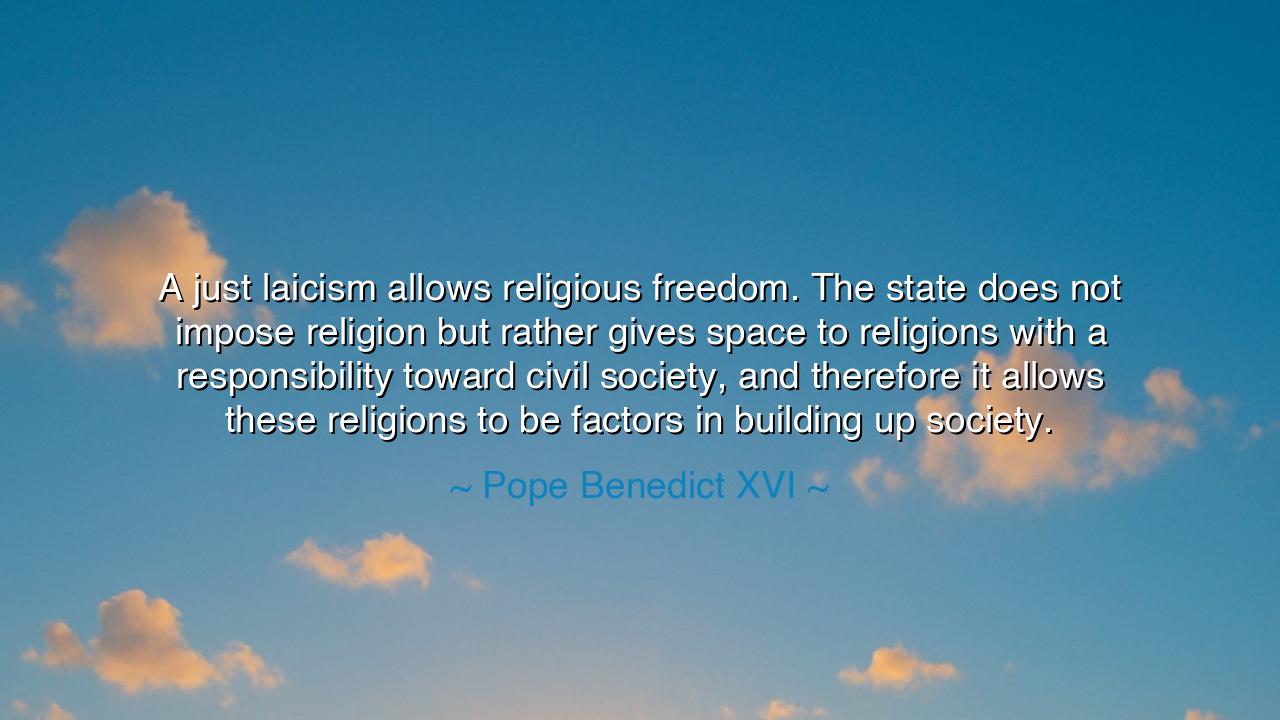
A just laicism allows religious freedom. The state does not
A just laicism allows religious freedom. The state does not impose religion but rather gives space to religions with a responsibility toward civil society, and therefore it allows these religions to be factors in building up society.






“A just laicism allows religious freedom. The state does not impose religion but rather gives space to religions with a responsibility toward civil society, and therefore it allows these religions to be factors in building up society.” Thus spoke Pope Benedict XVI, the scholar-pope, the quiet guardian of faith and reason. In these words, he wove together one of the most delicate truths of human civilization — that faith and freedom, though often seen as rivals, are in truth twin pillars of a just world. The Pope, drawing from centuries of Christian wisdom and the hard lessons of history, declared that neither religion nor state must rule over the other; rather, they must dwell side by side, each respecting the other’s domain, each serving the higher good of humanity.
To understand this teaching, one must first grasp the meaning of laicism. It is the principle of a state that stands apart from religion — not hostile to it, but independent. A “just laicism,” in Benedict’s vision, is not an empty secularism that seeks to banish the sacred from public life, but a balanced harmony where the state protects the freedom of conscience, and faith enriches the moral and cultural soil of society. It is a call for equilibrium, for a civil order that neither enforces belief nor suppresses it, recognizing that the human heart cannot be coerced in matters of the divine.
Benedict spoke these words in a time of great tension between faith and modernity. Across nations, religion was being pushed to the margins, reduced to private sentiment, stripped of its voice in the public square. He saw in this a grave danger: for when society silences the moral compass of faith, it begins to lose its soul. And when religion, in turn, seeks to dominate law or force belief, it betrays its own sacred essence. Thus, he called for a new covenant between the sacred and the civic — a partnership grounded in respect, justice, and mutual service.
The pages of history are filled with both the glory and the ruin of this relationship. Recall the world of the ancient Romans, who, in their empire, demanded worship of the state itself. The early Christians, refusing to offer incense to the emperor, suffered exile and death, but in doing so, they proclaimed a truth that would reshape civilization: that the conscience of man belongs to God alone. Centuries later, when religion gained power over kings, another imbalance arose — one that silenced dissent and confused spiritual authority with earthly rule. Both extremes brought suffering; both proved that true harmony between faith and state could exist only in justice and freedom.
One might also look to the example of Mahatma Gandhi, though born outside the Christian tradition, whose vision of India’s future embodied this same wisdom. He saw religion not as a tool of politics, but as the moral heartbeat of a free people. For Gandhi, true religion inspired justice, humility, and service — it did not command the sword. And in his struggle against oppression, he reminded the world that the spiritual and the civic must coexist, each strengthening the other. His words, like Benedict’s, echo through the ages: that faith, rightly lived, builds nations; it does not divide them.
Pope Benedict’s call for religious responsibility is equally vital. Freedom of faith does not mean freedom from moral duty. When religion enters the public square, it must do so not as a conqueror but as a servant — serving truth, compassion, and the common good. A just state gives religion space, but it is for the faithful to fill that space with wisdom, not fanaticism; with mercy, not pride. Religion, then, becomes not a fortress against the world, but a foundation for it — a light by which society can find its way through confusion and moral darkness.
So, my child, take this lesson as both caution and calling. Do not despise the secular, nor idolize the sacred. Both have their place, and when rightly ordered, they bring balance to human life. The state must guard freedom, but it is the spirit that must guard virtue. Let your faith inspire justice, not judgment; let your convictions build bridges, not walls. For in a world divided by ideology and fear, the greatest act of faith is not to dominate, but to cooperate in love.
And remember this: a society that silences religion silences its conscience, but a religion that seeks to rule loses its purity. The harmony that Benedict envisioned — of freedom, respect, and shared responsibility — is not a dream of the past, but a task for every generation. Play your part in that balance. Live your faith humbly, serve your community selflessly, and defend the freedom of others to seek their own light. For only then will humanity truly begin to build the world that God, and reason, both desire — a world where the heart and the law walk hand in hand.






AAdministratorAdministrator
Welcome, honored guests. Please leave a comment, we will respond soon